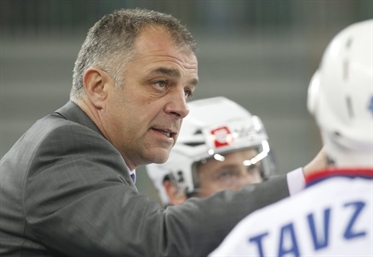To Sochi against all odds
To Sochi against all odds
Coach Kopitar’s “bumblebees” fly to their first Olympics

 Matjaz Kopitar, a former national team player himself, has been Slovenia's head coach for three years and oversaw the team's Olympic qualification in Denmark. Photo: Samo Vidic
Matjaz Kopitar, a former national team player himself, has been Slovenia's head coach for three years and oversaw the team's Olympic qualification in Denmark. Photo: Samo Vidic
It does not have it in terms of wing size or beats per second to achieve flight with the degree of wing loading necessary.
Translated to hockey the above lines could read like this:
According to common sense, the laws of international sports competition prove that a country which has one professional team, 140 senior players and seven indoor rinks should be incapable of competing at the highest ice hockey level, as it does not have the capacity – in terms of having enough players or the necessary facilities – to achieve the quality that it takes to qualify for the Olympics.
But just as in the case with the bumblebee, nobody has told that to the Slovenians. After the sensationally remarkable performance at the Final Olympic Qualification in Vojens, Denmark, the nation of not even 2 million people, qualified for Sochi 2014.
It is indeed sensationally remarkable because, not only did they qualify against all odds, they did so emphatically that Sunday’s final two games, became irrelevant.
Coming in as an 18th seed overall, and third-seeded out four teams in Group F, they started off by defeating 13th-seeded Belarus (with 17 KHL players) 4-2 on Thursday and one day later they killed the qualifying tournament by edging 12th-ranked Denmark 2-1. With six points and only one game to go, it was impossible for any other team to overtake Slovenia.
The loud capacity crowd of 5,000 fans at the SE Arena in Vojens watched in disbelief as the Slovenian players celebrated as had they won a gold medal, many of them teary eyed. 33-year-old captain Tomaz Razingar – who scored the game-winner against Belarus on a penalty-shot – was crying in the mixed-zone before he took questions from reporters.
Continue readingIn the modern era of Olympic hockey tournaments and qualifications, Slovenia’s earning a spot among the twelve top teams in the world – for the first time since the country’s independence in 1992 – is arguably the biggest surprise.
Apart from the facts listed earlier – one team, 140 players (some experts say that this even is a stretch) and seven indoor rinks – consider this:
- Since the IIHF introduced its World Ranking system, Slovenia has never been ranked higher than 15th (2008)
- In the last three years their ranking has been 18-18-19.
- Slovenia’s annual challenge is remain among the Top-16 teams that play in the IIHF Ice Hockey World Championship, or to earn promotion to the tournament. In the last six years, Slovenia has been in Top-16 division only twice. But they won the most recent Division I tournament at home in Ljubljana last spring and they will be at the 2013 Worlds in Stockholm and Helsinki, of course, a perfect preparation for Sochi.
- After having relied on several foreign coaches 2004-2010, the Slovenian Ice Hockey Association decided to go with domestic leadership and hired Matjaz Kopitar, the 47-year-old father of NHL star Anze Kopitar (Los Angeles Kings) and his brother Gasper, who was on the national team which won in Vojens.
“Things were maybe not that good with the national team when they asked me to be the coach,” said Matjaz Sr when IIHF.com spoke with him last Friday, after that the most ecstatic post-game celebrations had calmed down before midnight.
“We had problems with getting players to commit to the national team. We laid down some new rules, the players bought into the concept, and now we have a different level of respect and commitment. We truly have a great team concept.”
This is probably not an exaggeration. Whenever a Slovenian player was interviewed after the games in Vojens, they consistently referred to the team as “family” and they called it their “seventh player”.
“If the players said so, this makes me very proud,” said Kopitar. “This means that we succeeded with the entire plan, to be well prepared for the games and to have the right spirit in the room. We know that we need that, because we play against teams that in most cases have more talent than us.”
“And in Vojens we were rewarded for our hard work and for our team spirit. You can say that we maybe were a little lucky here and there, but I believe that any luck you have, you worked hard for it. You make your own luck.”
After the bankruptcy and demise of Acroni Jesenice in autumn 2012, the city the Kopitars hail from, Slovenia has but one fully professional hockey club, Olimpija Ljubljana, which plays in the international Austrian EBEL league.
Coming from the city of Jesenice, no one is more aware of the challenges that Slovenian ice hockey faces on a daily basis, including the shallow player pool, which of course makes the job of the national team coach very difficult. How do you select national team which is going to the Olympics if all you have is 120-140 players? Reality is that the number of players, who can compete against the best in the world, is considerably smaller.
The team which took Slovenia to Sochi is comprised of players from ten countries. Only two play in Slovenia, of course for Olimpija Ljubljana. Many other players don’t even play in the top leagues in the country. Captain Tomaz Razingar and the Rodman brothers Marcel and qualifications hero David play in the second German league. The coach’s younger son, Gasper Kopitar, plays in the second Swedish league.
There are players from teams in Italy, Croatia, Slovakia, France, Ukraine and Denmark.
“This is why this team and our win is a miracle,” said coach Kopitar. “Hockey in our country deserves better. There is passion and talent. Hopefully this qualification for the Olympics can turn things around with hockey in Slovenia.”
Before things do change around, Matjaz Kopitar will have to rely on what he has built up since assuming the job a little more than two years ago – a team that plays as if they were a family.
Back to Overview











































